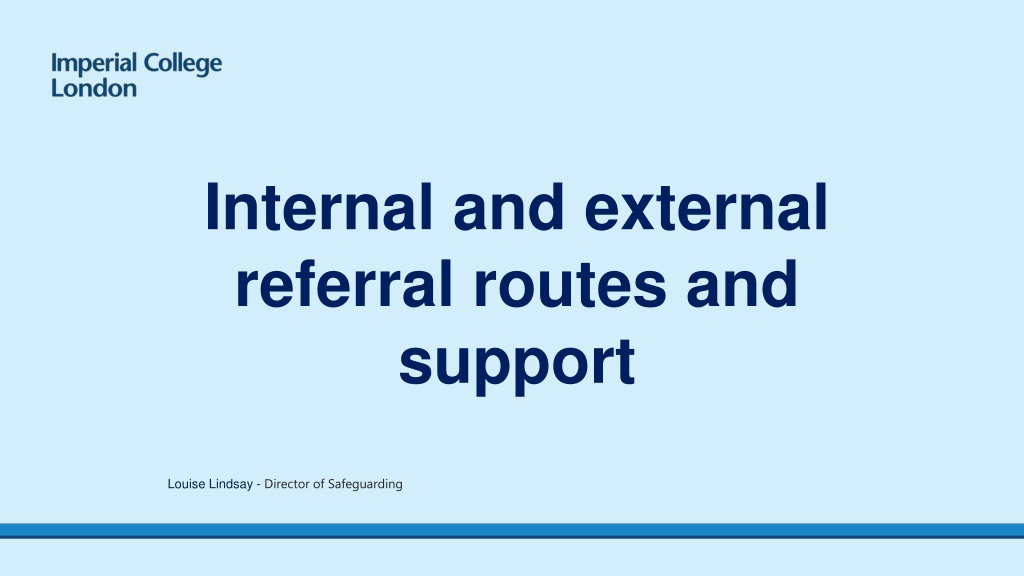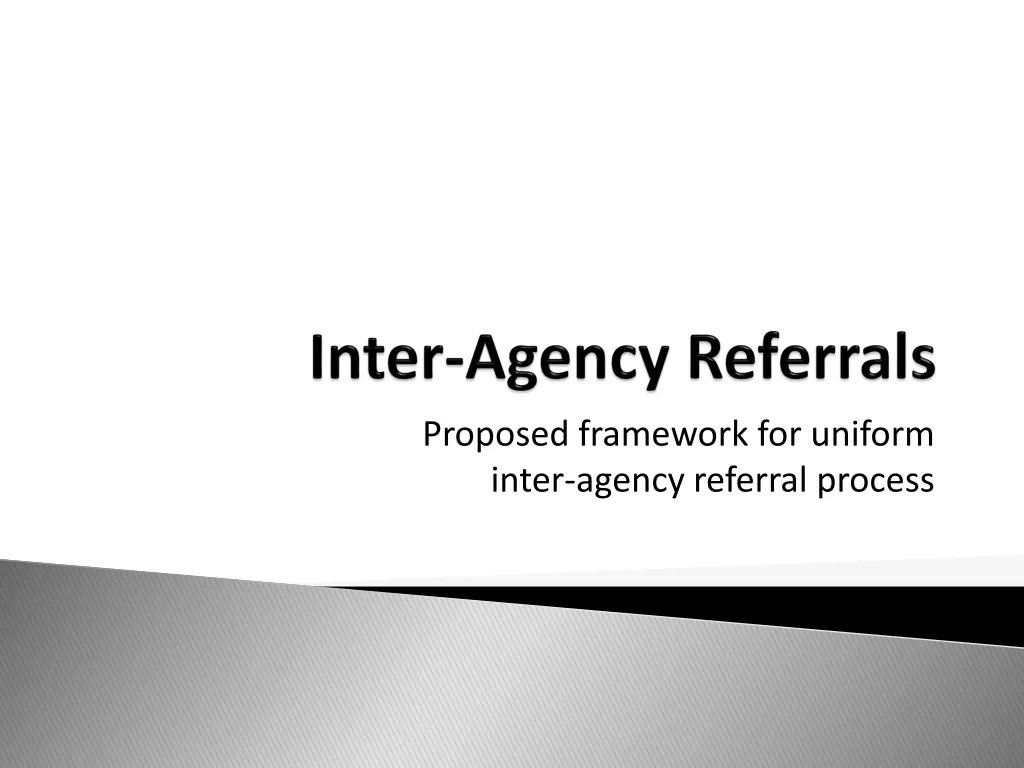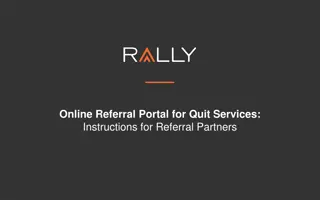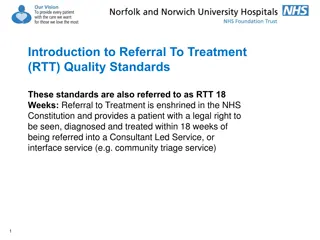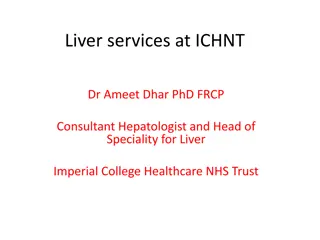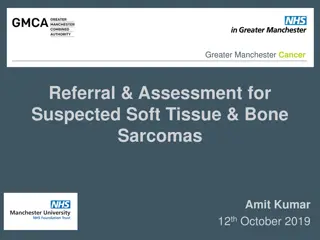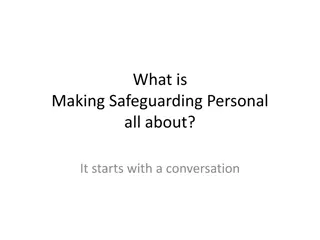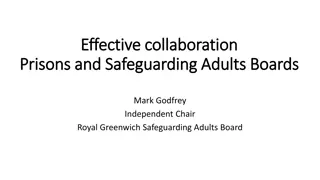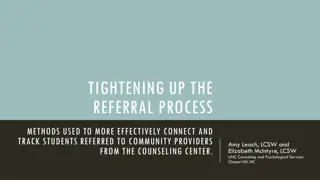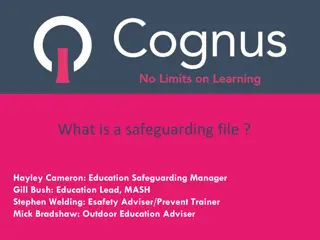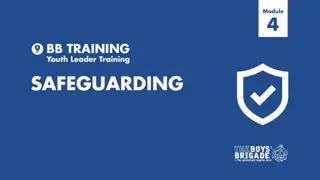Safeguarding Policies and Referral Routes at Imperial College
The safeguarding policies at Imperial College outline procedures for staff to report concerns about the welfare of children and vulnerable adults involved in college activities. Referrals flow through local safeguarding officers and may involve the DBS, social services, Local Authority Designated Officer, or Police when necessary. Guidelines are provided for responding to allegations of abuse and raising low-level safeguarding concerns. The definition of an adult at risk, care and support needs, and the role of Local Authorities are also highlighted.
Download Presentation

Please find below an Image/Link to download the presentation.
The content on the website is provided AS IS for your information and personal use only. It may not be sold, licensed, or shared on other websites without obtaining consent from the author. Download presentation by click this link. If you encounter any issues during the download, it is possible that the publisher has removed the file from their server.
E N D
Presentation Transcript
Internal and external referral routes and support Louise Lindsay - Director of Safeguarding
Safeguarding Policy 8. A member of staff who has any concerns regarding the welfare of a child or vulnerable adult who is involved in Imperial College activities must report their concerns to their local safeguarding officer as an individual set out in the referrals flowchart see Imperial College safeguarding webpages. The Local Safeguarding Officer will liaise with the appropriate Lead Safeguarding Officer. 9. The Lead Safeguarding Officer will guide on appropriate action and may refer the case as appropriate to the DBS, to children s social services where s/he has concluded that someone may have caused harm or abuse or poses a risk of harm or abuse to a child, to the Local Authority Designated Officer where there are concerns that that a member of staff may be abusing a child, and/or to the Police where there is a concern that a crime may have been committed. Policy and Code of Practice
Responding to allegations of abuse Familiarise yourself with Guidelines for staff on how to respond to allegations or suspicions of abuse or harm and concerns about welfare Responding to allegations of abuse
Familiarise yourself with Guidance on raising Low level concerns A low-level concern is any concern, no matter how small, and even if no more than causing a sense of unease or a nagging doubt that an adult working on or on behalf of Imperial College may have acted in a way that is inconsistent with our code of conduct. This could include inappropriate behaviour outside of work. A low-level concern may not meet the harm threshold for referral to the Local Authority Designated Officer. The harm threshold is an allegation that means that a person who works with children has: behaved in a way that has harmed a child, or may have harmed a child; and/or possibly committed a criminal offence against or related to a child; and/or behaved towards a child or children in a way that indicates they may pose a risk of harm to children; and/or behaved or may have behaved in a way that indicates they may not be suitable to work with children Low level concerns may arise as a result naivety, be accidental or unintentional, be the result of misinformed action, a failure to follow procedures, a lack of training or, more rarely, deliberate abuse. Guidance on raising Low level safeguarding concerns
Local Authority role for adults at risk Definition of an Adult at Risk In Safeguarding terms, an Adult at Risk is a person over the age of 18 who: Appears to have or may have needs for care and support; and Appears to be experiencing, or is at risk of, abuse or neglect; and As a result of those needs, appears to be unable to protect themselves against the abuse or neglect, or the risk of it. A Safeguarding Concern should be raised if you have witnessed or been made aware of a person that meets the above criteria. What are Care and Support Needs? Care and Support Needs are the mixture of practical, financial, and emotional support for adults who need extra help to manage their lives and be independent. They arise from or are related to physical or mental impairment or illness. This can include conditions that result from physical, mental, sensory, learning, or cognitive disabilities/illnesses, substance misuse, or brain injury.
Pre-alert actions Emergency Services - If the adult is in immediate danger of abuse/neglect (including threats to take their life), or if a crime has been committed Phone 999 (if urgent) or 101 (if non-urgent). Care and Support Pathway - If the adult is struggling with day-to-day activities (e.g., washing, cooking, shopping) and needs support to live safely and independently, contact Adult Social Care: Phone: 0800 145 6095 (8am to 6pm Monday to Friday) Mental Health Pathway - If the adult is struggling with their mental health, or is open to Community Mental Health Services, contact the NHS West London Single Point of Access (SPA): Phone: 0800 328 4444 (24 hours a day, 7 days a week, 365 days a year) Confidentiality - NOTE: Consent is usually required from an adult to make a referral so, if possible, it is best to encourage the adult themselves to initiate contact with care and support pathways but we can signpost services that are available.
Suitability - If you are not sure that the adult meets the Definition of an Adult at Risk, email safeguardingadults@lbhf.gov.uk (or the equivalent service in the relevant borough). Local safeguarding boards: Hammersmith & Fulham - 020 8753 6600 Kensington and Chelsea - 020 7361 3013 Westminster - 020 7641 4000 Alternatively, for under 18's, you can contact the NSPCC and speak to their advisors for advice and support 24hrs a day on 0808 800 5000. In a safeguarding emergency, you can also call the police on 999.
Safeguarding Leads Hannah Bannister -Director of Student Services h.bannister@imperial.ac.uk Tele. 07566 950 942 Tracy Halsey - Head of EYEC t.halsey@imperial.ac.uk Tele. 020 7594 5127 Melanie Bottrill - Head Outreach Programmes m.bottrill@imperial.ac.uk Tele. 020 7594 3685 Louise Lindsay - Director of Safeguarding l.lindsay@imperial.ac.uk Tele. 07872 850291
A reminder of Imperial College teams with support options STAFF STUDENTS Human Resources Student Counselling Claire Fox - Head of Student Counselling & Mental Health c.fox@imperial.ac.uk Tele. 020 7594 5310 Contact us webpage link Human Resources-Contact us for support Disability Advisory Services Occupational Health Maureen O Brien - Head of Disability Advisory Service maureen.obrien@imperial.ac.uk Tele. 020 7594 2168 Claire O'Brien - Director of Occupational Health c.obrien@imperial.ac.uk Tele. 020 7594 9392
If in doubt, please contact Louise Lindsay Director of Safeguarding l.lindsay@imperial.ac.uk 07872 850291
